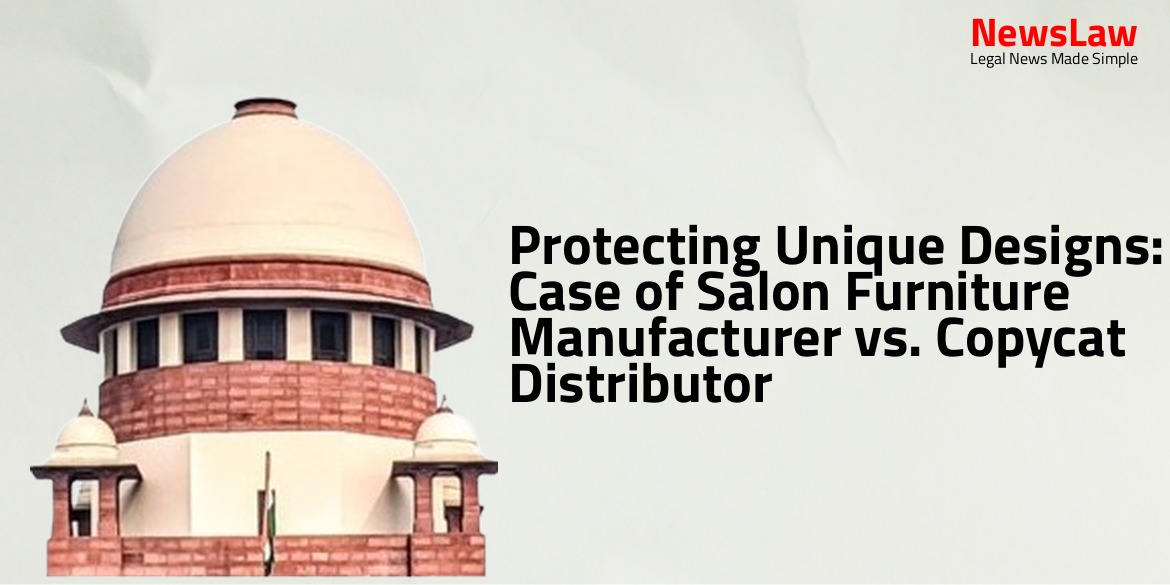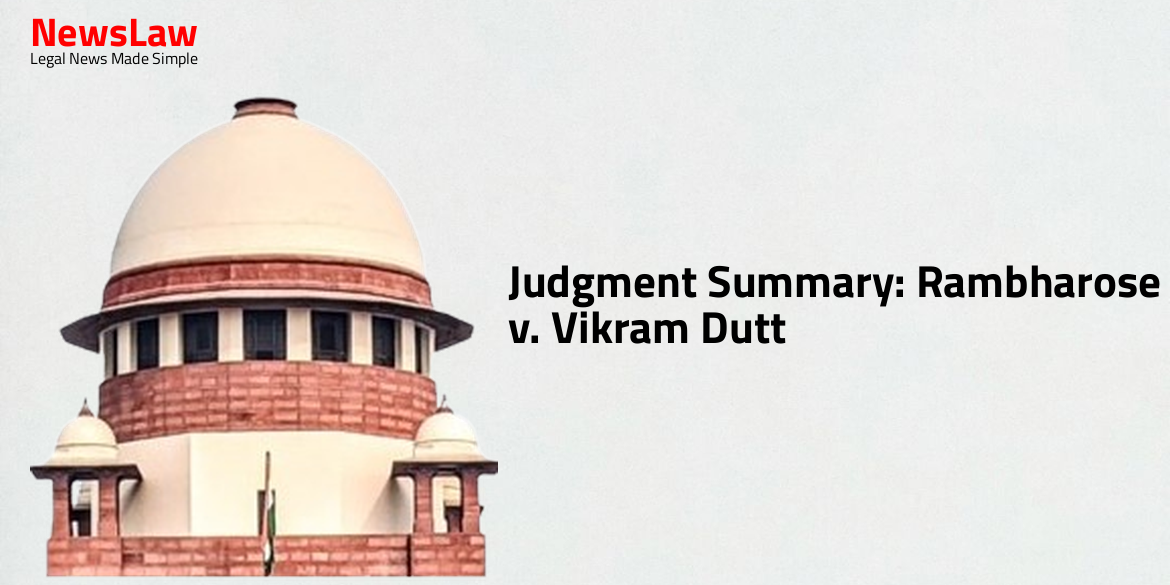In a notable legal case before the Delhi High Court, a Salon Furniture Manufacturer took action against a Copycat Distributor for alleged copyright infringement and passing off. The petitioner, a well-established manufacturer of salon furniture under the brand ‘MARC’, accused the respondent of imitating their unique designs. The court’s decision sets a precedent for protecting the integrity of original designs in the industry. Let’s delve into the details of this crucial case.
Facts
- Plaintiff filed a suit against the defendant alleging passing off, copyright infringement, unfair competition, and unfair trade practices.
- Plaintiff claims to be a manufacturer of salon furniture in India, dealing in a wide range of salon, spa, and parlor furniture products.
- Plaintiff has a strong market presence domestically and internationally in this product category.
- The defendant registered a deceptively similar domain name and hosted a website with similar content to the plaintiff’s.
- Plaintiff has invested resources in designing and developing unique salon furniture products.
- Court granted an ex parte ad interim injunction in favor of the plaintiff, restraining the defendant from imitating the plaintiff’s products.
- Mr. Acharya, associated with the plaintiff earlier, is now accused of copying the plaintiff’s salon furniture designs and pictures.
- Plaintiff claims copyright in their product pictures and seized 48 infringing articles.
- Mediation between the parties failed, and the defendant received the seized infringing articles back on superdari.
- The defendant’s attempt to vacate the injunction while it was in place is also mentioned in the case summary.
Arguments
- Plaintiff’s counsel highlighted that they were duly advertising their brand and design.
- Plaintiff showed a comparative chart between their product and the defendant’s to argue similarities and differences.
- Defendant’s counsel argued they had their own trademark, ‘DECORITE’, while the plaintiff’s goods were under the brand name ‘MARC’.
- Plaintiff emphasized that the defendant’s change in furniture color was not to distinguish from them based on the interior designer’s preferences.
- Plaintiff entered into consent decrees with ‘Luxe Salon’ and ‘Sakhi Enterprises’, preventing them from claiming passing off by the defendant.
- Plaintiff showcased samples of their products in industry-specific magazines to prove uniqueness.
- Plaintiff referenced past legal cases emphasizing the importance of shape and false representations in design disputes.
- Defendant claimed the plaintiff imported their products and had no uniqueness in design.
- Plaintiff’s counsel argued that the defendant’s adoption of a similar domain name and representation was dishonest.
- Plaintiff contended that customization of furniture was a new market trend, arguing against the defendant’s claim of commonality in designs.
- Defendant claimed they procured furniture from third-party manufacturers inspired by global products and contested the uniqueness of plaintiff’s designs.
- Defendant argued against granting relief to the plaintiff, stating the suit was for passing off and there was no uniqueness in the designs claimed by the plaintiff.
- Defendant’s counsel argued that the design of the plaintiff was not distinctive like in the Gorbatschow Wodka KG case.
- Defendant claimed to have been associated with various players in the market as an informal distributor.
- Plaintiff’s counsel emphasized that they are manufacturers of unique salon furniture and had designed and developed it themselves.
- An email from the plaintiff’s representative to the defendant’s representative was presented as evidence of quotation for furniture supply.
- The interview of Mr. Durgesh Sharma suggested that the company focused on customizing and creating indigenous furniture rather than importing.
- There was a lack of documented evidence to prove all of the 45 designs listed by the plaintiff were being used since 2014.
Analysis
- Reliance on the decision of the Delhi High Court in Eicher Goodearth Private Limited v. Krishna Mehta & Ors. on copying of the design by the plaintiff who was the prior user.
- Citing the case of KRBL Ltd. v. PK Overseas Pvt. Ltd. where substantial copy for copyright infringement was emphasized.
- Consideration of lack of plausible explanation by the defendant as a weighing circumstance.
- Reference to the case R.R. Oomerbhoy Pvt. Ltd. v. Court Receiver regarding resemblance of container and plastic bottle shapes to the plaintiff’s design.
- Highlighting the importance of trade dress in Colgate Palmolive Company v. Anchor Health and Beauty Care Pvt. Ltd., emphasizing how it aids in identifying the source of goods.
- Confirmation of the injunction in favor of the plaintiff in I.A. 13157/2021 dated 7 October, 2021.
- Disposal of I.A. No 16893/2021 and I.A. 13157/2021 accordingly.
- Listing the case before the Joint Registrar (Judicial) on 25 July, 2024.
- Mention of the Division Bench judgment in Aktiebolage Volvo v. Volvo Steels Limited focusing on the reason for the adoption of the mark.
- The court analyzed the documents and submissions from both parties.
- The plaintiff is entitled to the injunction as requested.
- The defendant’s plea for vacation of the injunction is not supported.
- Section 2(zb) of the Trade Marks Act includes shape of goods as part of ‘trademark’.
- Determining resemblance based on scattered pictures is not conclusive.
- Examples provided where defendant’s chair design mirrored that of the plaintiff’s.
- There is a clear attempt by the defendant to create confusion with a similar domain name.
- The shape of goods is considered a ‘mark’ under Section 2(m) of the Act.
- The plaintiff’s goodwill in distinctive product appearance could support a cause of action.
- No evidence that the defendant preceded the plaintiff in the industry.
- Defendant’s allegation of copying international products contradicted by industry awards received by the plaintiff.
- Defendant’s prior association as a distributor for the plaintiff indicates knowledge of the products.
- Defendant likely leveraged market knowledge to imitate plaintiff’s products on their own website.
- Presence of 45 identical designs on defendant’s website shown by the plaintiff is substantial evidence of passing off.
- The court’s decision influenced by precedents emphasizing the importance of protecting the shape of goods as trademarks.
Decision
- The Court examined the provisions of the RPC in detail.
- The Court considered the arguments presented by both parties regarding the relevance of the RPC.
- It was noted that the RPC plays a crucial role in regulating the conduct of parties involved in the case.
- The Court analyzed the specific sections of the RPC that were relevant to the case at hand.
- The Court made a key observation regarding the interpretation of a particular provision of the RPC.
- The Court concluded that the provisions of the RPC were applicable and had a direct impact on the outcome of the case.
Case Title: MARC SALON AND BEAUTY EQUIPMENTS PVT LTD Vs. GM SALES (2024:DHC:4618)
Case Number: CS(COMM)-493/2021



